More iPhone buyers switching from Android this year than in 2012
Last updated
New research by Consumer Intelligence Research Partners, based on interviews of 400 new iPhone 5s and 5c buyers, indicates that an increasing proportion of Apple's customers are coming from Android compared to last year.
At the launch of iPhone 5 one year ago, about 16 percent of iPhone 5 buyers said they were upgrading from an Android phone, CIRP depicts in its chart (above). This year, at least 20 percent of new iPhone 5s and 5c buyers said they were moving from Android.
The increased percentage that's switching is also telling in that Apple sold significantly more new iPhones at this year's launch. The global market for phones is increasing, and the number of iPhone buyers getting their first phone was also up.
What's decreasing is the number of iPhone buyers moving up from a basic phone or from BlackBerry or some other smartphone platform, due to the fact that there are simply fewer people who still own a "non-smart," BlackBerry or other non-Android phones this year.
As Mike Levin, a Partner and Co-Founder of CIRP, stated in the firm's press release, "perhaps because of the declining base of non- smartphone owners, a smaller percentage of iPhone buyers upgraded from a basic or flip phone, compared to the year-ago launch."
Returning iOS users also up
CIRP's release emphasized a different aspect of the same data: that more iPhone buyers this year were already iPhone customers. That figure increased from 55 percent last year to 65 percent this year.
Significantly more Android owners are moving to an iPhone than iPhone users are moving in the opposite direction
Levin stated to AppleInsider via email that "this increase from 55% in 2012 is very meaningful, especially since it's really a fair comparison, of buyers in the two 30-day periods after the launch of the iPhone 5 and iPhone 5s/5c."
Logically, the percentage of iOS buyers loyally returning for a new iPhone would necessarily rise in conjunction with the increases in Apple's market share as customer satisfaction levels also remain high.
But the percentage of increase among returning iPhone buyers is a little over 18 percent over last year; the percentage of new iPhone buyers coming from an Android legacy is up even more: 25 percent.
Once bitten twice iPhone
CIRP's latest study reflects the firm's earlier findings from this fall reporting that significantly more Android owners are moving to an iPhone than iPhone users are moving in the opposite direction.
Specific to Apple and Samsung, the world's two largest smartphone vendors by a large margin, Apple's customers were more likely to come from BlackBerry, while a larger percentage of Samsung's buyers were coming from HTC and Nokia.
Overall, however, Apple was seeing a greater percentage of converts from Samsung (20 percent) than Samsung was seeing from previous iPhone buyers (just 7 percent).
Looking only at customers who had switched brands, one third of Apple's new customers had previously owned a Samsung device, but only 11 percent of Samsung's customers came from Apple.
CIRP also noted this fall that Apple's customers represented more young adults between 18-24 and 25-34, while Samsung attracted more middle age buyers aged 35-54 and significantly more seniors aged 55 to 64, as well as more customers with lower incomes.
The trend toward Apple and iOS is focused entirely at the high end of the smartphone market, because Apple does not participate in the "mass market" for low end phones priced significantly below $400.
Last week, a Samsung Mobile executive revealed that only about a third of the company's "smartphones" were premium models comparable in specification and utility to Apple's modern iPhone lineup.
Samsung's financial reports have also detailed that its smartphone shipment growth is coming entirely from mid and low end models, while global demand for its higher end Galaxy S and Note offerings remained flat despite the launch of the company's new flagship Note III premium phablet.
 Daniel Eran Dilger
Daniel Eran Dilger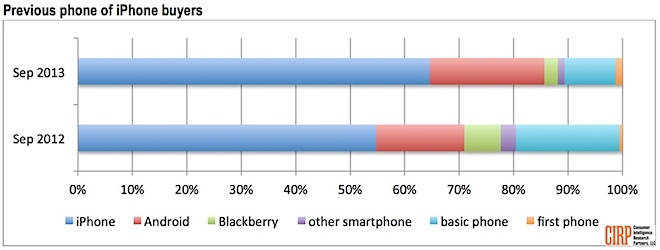
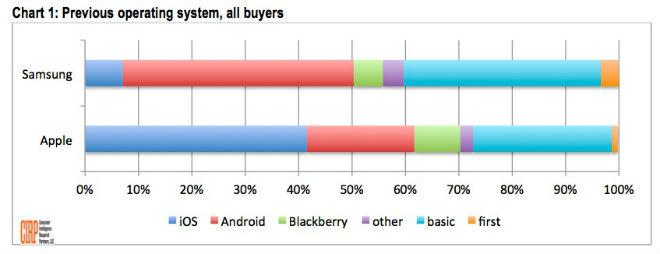
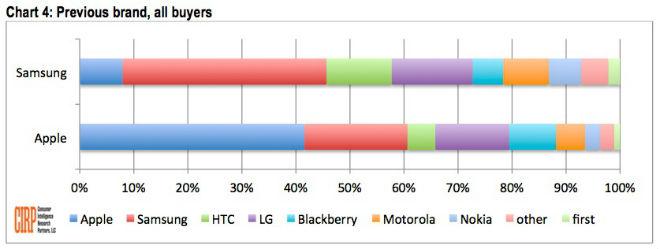
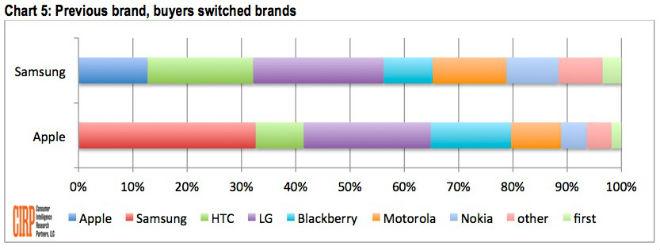
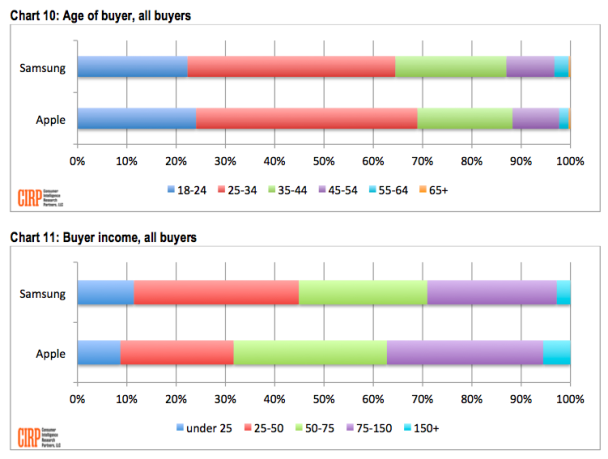














 Amber Neely
Amber Neely
 Thomas Sibilly
Thomas Sibilly
 AppleInsider Staff
AppleInsider Staff
 William Gallagher
William Gallagher
 Malcolm Owen
Malcolm Owen
 Christine McKee
Christine McKee










81 Comments
Meh. That sample is far too small and non-representative to adequately detect a reliable and generalizable effect. The article itself has far too little information to glean any context about how the data was collected.
[quote name="Carthusia" url="/t/160664/more-iphone-buyers-switching-from-android-this-year-than-in-2012#post_2432833"]Meh. That sample is far too small and non-representative to adequately detect a reliable and generalizable effect. The article itself has far too little information to glean any context about how the data was collected.[/quote] Let me guess: you are an Android user, yes?
I don't think it's really nessecary to see how the data was collected. It's pretty clear Apple is gaining, even after 6 years on the market, and it doesn't really matter if their customers are coming from Samsung or Blackberry. I can see the incentive from Enterprice users moving away from Blackberry clearly. What I don't understand is why people are switching over from Samsung. I thought that was the 'mother of them all' with an open OS, free apps, ecosystem, large display phones, quality built with expendability and all that. Articles like these usually attract non-iPhone users so I'd like to hear what it is that makes people switch from Samsung to Apple.
[quote name="sog35" url="/t/160664/more-iphone-buyers-switching-from-android-this-year-than-in-2012#post_2432837"]I'm one of the Android users switching to Apple. Bottom line is Android can fool you into buying the hype but after 2 years of HELL I'm glad to be on iOS. [/quote] Can you explain what makes Android Hell to use? For the uninformed, like me. Thanks. Edit. After reading various Android sites I understand why one would describe it as Hell. So no need to respond, unless you want to get something off your chest.
Apple will get stronger and stronger. The questions are: Can they grow faster? The industry is outgrowing them, but does it matter? Could they make a better iPhone if they followed a few current trends (like a bigger screen)? What are the developers saying about the current market? What are their feelings about Android Vs iOS?
Those are the questions. Personally, I think that Apple is doing an amazing job (better than everybody else) but they could be in an even better position if they were a little more flexible. Web browsing is better on a big screen. Watching videos is better on a big screen. Playing games is better on a big screen. Reading and editing documents on the go is better on a big screen.
But they do not "need" to do it. If the last 15 years are a good indication, they know what they are doing. Having said that, the focus on margins doesn't make sense.